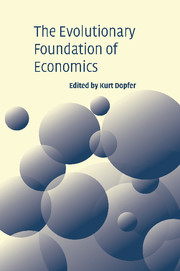Book contents
- Frontmatter
- Contents
- List of contributors
- List of figures
- List of tables
- Prolegomenon
- I Ontological foundations
- II A framework for evolutionary analysis
- 8 Towards an evolutionary theory of production
- 9 Learning in evolutionary environments
- 10 The evolutionary perspective on organizational change and the theory of the firm
- 11 The self-organizational perspective on economic evolution: a unifying paradigm
- 12 Evolutionary concepts in relation to evolutionary economics
- 13 Understanding social and economic systems as evolutionary complex systems
- 14 Perspectives on technological evolution
- 15 Evolutionary economic dynamics: persistent cycles, disruptive technology and the trade-off between stability and complexity
- 16 Evolutionary theorizing on economic growth
- Index of topics
- Index of names
- References
12 - Evolutionary concepts in relation to evolutionary economics
Published online by Cambridge University Press: 22 September 2009
- Frontmatter
- Contents
- List of contributors
- List of figures
- List of tables
- Prolegomenon
- I Ontological foundations
- II A framework for evolutionary analysis
- 8 Towards an evolutionary theory of production
- 9 Learning in evolutionary environments
- 10 The evolutionary perspective on organizational change and the theory of the firm
- 11 The self-organizational perspective on economic evolution: a unifying paradigm
- 12 Evolutionary concepts in relation to evolutionary economics
- 13 Understanding social and economic systems as evolutionary complex systems
- 14 Perspectives on technological evolution
- 15 Evolutionary economic dynamics: persistent cycles, disruptive technology and the trade-off between stability and complexity
- 16 Evolutionary theorizing on economic growth
- Index of topics
- Index of names
- References
Summary
Introduction
Evolutionary theory is enjoying a renaissance; in many disciplines, including economics, there has been a substantial flourishing of ideas that does much more than pay scholarly homage to one of the principal scientific developments of all time. For economists interested in innovation, competition, growth and development, an interest in the evolutionary idea is not difficult to establish; for the central empirical fact of the past two centuries, if not longer, has been sustained change and transformation in the patterns of activities that define modern economies. The evidence is pervasive and compelling. The creation of new activities, the demise of established ones and the constant shifts in the economic importance of surviving activities are ever-present symbols of the changes taking place in many different locations at different rates. The structural and qualitative transformations they produce in our economic world in comparatively short spaces of time are remarkable indeed – nothing less than a continuous remodelling and shifting around of the economic furniture.
Two principal approaches to evolutionary theory provide a powerful framework within which to order and comprehend these self-transforming events and make sense of the colourful tapestry of economic change. The two meanings of evolution I shall refer to are the traditional, developmentalist idea of the internal unfolding of entities, and the modern idea – post-Darwinian – of evolution as the adaptation of populations of entities under a guiding process of competitive selection.
- Type
- Chapter
- Information
- The Evolutionary Foundations of Economics , pp. 391 - 430Publisher: Cambridge University PressPrint publication year: 2005
References
- 12
- Cited by

